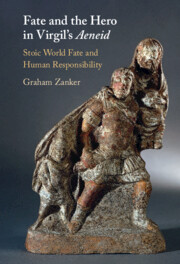Book contents
- Fate and the Hero in Virgil’s Aeneid
- Fate and the Hero in Virgil’s Aeneid
- Copyright page
- Dedication
- Contents
- Preface
- Abbreviations
- Introduction
- Chapter 1 Stoic World Fate and Virgil’s Aeneid
- Chapter 2 Fate and the Human Responsibility of Dido and Aeneas in Aeneid 4: A Case Study
- Chapter 3 Stoic World Fate and the Gods of the Aeneid
- Chapter 4 Stoic World Fate and the Humans of the Aeneid
- Chapter 5 Stoic World Fate and Roman Imperium in the Aeneid: Tragedy and Didacticism
- Book part
- References
- Index Locorum
- Index
Chapter 1 - Stoic World Fate and Virgil’s Aeneid
Published online by Cambridge University Press: 06 April 2023
- Fate and the Hero in Virgil’s Aeneid
- Fate and the Hero in Virgil’s Aeneid
- Copyright page
- Dedication
- Contents
- Preface
- Abbreviations
- Introduction
- Chapter 1 Stoic World Fate and Virgil’s Aeneid
- Chapter 2 Fate and the Human Responsibility of Dido and Aeneas in Aeneid 4: A Case Study
- Chapter 3 Stoic World Fate and the Gods of the Aeneid
- Chapter 4 Stoic World Fate and the Humans of the Aeneid
- Chapter 5 Stoic World Fate and Roman Imperium in the Aeneid: Tragedy and Didacticism
- Book part
- References
- Index Locorum
- Index
Summary
Stoicism before Chrysippus believed in radical determism, but Chrysippus reintroduced the notion of human responsibility. He argued that it is in our power to assent to an impression or otherwise and work with it, and it is likewise in our power to assent to or to reject World Fate, working with or against it. He illustrated this with his analogy with the top that needs a spin: its spinnability is its inherent cause, but needs an external cause to activate it. In this way, he further posited, we can assign good or bad morality to humans, judging by their will to live Stoically, that is, ‘in accordance with nature’, the Stoics’ highest virtue. Virgil adopts this model in the Aeneid, so that Aeneas can be seen as learning to assent to World Fate, while Juno, Dido and Turnus can ignore or reject it. Virgil in fact incorporates Chrysippus’ analogy in a simile depicting Amata driven by her inherent desire and by the daemonic goddess Allecto to deny her assent to World Fate. However, he locates deviations from World Fate within the Stoic category of ‘events in suspension’, ‘indifferents’ or individual fortunes, which might temporarily challenge World Fate but never negate it.
Keywords
- Type
- Chapter
- Information
- Fate and the Hero in Virgil's AeneidStoic World Fate and Human Responsibility, pp. 9 - 40Publisher: Cambridge University PressPrint publication year: 2023

